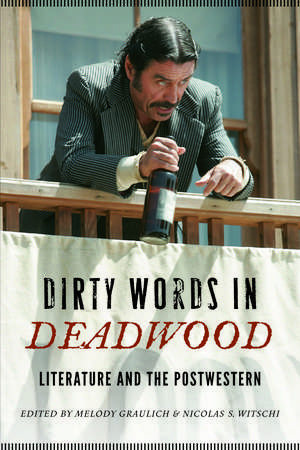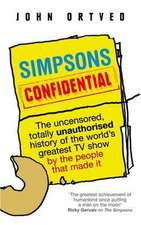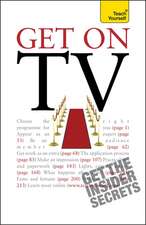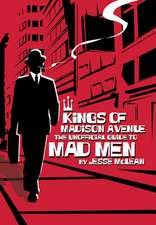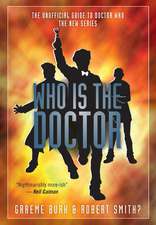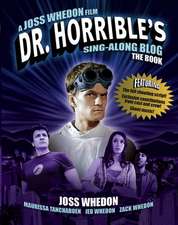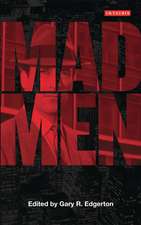Dirty Words in Deadwood: Literature and the Postwestern: Postwestern Horizons
Editat de Melody Graulich, Nicolas S. Witschien Limba Engleză Paperback – iul 2013
As Graulich observes in her introduction: “With its emotional coherence, compelling characterizations, compressed structural brilliance, moral ambiguity, language experiments, interpretation of the past, relevance to the present, and engagement with its literary forebears, Deadwood is an aesthetic triumph as historical fiction and, like much great literature, makes a case for the humanistic value of storytelling.” From previously unpublished interviews with series creator David Milch to explorations of sexuality, disability, cinematic technique, and western narrative, this collection focuses on Deadwood as a series ultimately about the imagination, as a verbal and visual construct, and as a literary masterpiece that richly rewards close analysis and interpretation.
Din seria Postwestern Horizons
-
 Preț: 117.96 lei
Preț: 117.96 lei -
 Preț: 115.06 lei
Preț: 115.06 lei -
 Preț: 400.71 lei
Preț: 400.71 lei -
 Preț: 357.49 lei
Preț: 357.49 lei -
 Preț: 201.84 lei
Preț: 201.84 lei -
 Preț: 217.14 lei
Preț: 217.14 lei -
 Preț: 158.97 lei
Preț: 158.97 lei -
 Preț: 217.62 lei
Preț: 217.62 lei -
 Preț: 254.97 lei
Preț: 254.97 lei -
 Preț: 502.82 lei
Preț: 502.82 lei -
 Preț: 217.90 lei
Preț: 217.90 lei -
 Preț: 428.75 lei
Preț: 428.75 lei -
 Preț: 398.03 lei
Preț: 398.03 lei -
 Preț: 259.38 lei
Preț: 259.38 lei -
 Preț: 211.16 lei
Preț: 211.16 lei -
 Preț: 428.53 lei
Preț: 428.53 lei -
 Preț: 177.94 lei
Preț: 177.94 lei -
 Preț: 513.54 lei
Preț: 513.54 lei -
 Preț: 217.31 lei
Preț: 217.31 lei -
 Preț: 219.64 lei
Preț: 219.64 lei -
 Preț: 255.74 lei
Preț: 255.74 lei -
 Preț: 223.66 lei
Preț: 223.66 lei -
 Preț: 184.36 lei
Preț: 184.36 lei -
 Preț: 185.13 lei
Preț: 185.13 lei
Preț: 292.05 lei
Nou
Puncte Express: 438
Preț estimativ în valută:
55.88€ • 58.50$ • 46.24£
55.88€ • 58.50$ • 46.24£
Carte tipărită la comandă
Livrare economică 05-19 aprilie
Preluare comenzi: 021 569.72.76
Specificații
ISBN-13: 9780803264748
ISBN-10: 0803264747
Pagini: 360
Ilustrații: 23 illustrations, 2 appendixes, index
Dimensiuni: 152 x 229 x 25 mm
Greutate: 0.5 kg
Editura: Nebraska Paperback
Colecția University of Nebraska Press
Seria Postwestern Horizons
Locul publicării:United States
ISBN-10: 0803264747
Pagini: 360
Ilustrații: 23 illustrations, 2 appendixes, index
Dimensiuni: 152 x 229 x 25 mm
Greutate: 0.5 kg
Editura: Nebraska Paperback
Colecția University of Nebraska Press
Seria Postwestern Horizons
Locul publicării:United States
Notă biografică
Melody Graulich is a professor of English and American studies at Utah State University and the editor of Western American Literature. She is the coeditor of In Search of a Common Language: Environmental Writing and Education and Reading “The Virginian” in the New West: Centennial Essays (Nebraska, 2003). Graulich won the 2014 Mary C. Turpie Award from the American Studies Association. Nicolas S. Witschi is a professor of English at Western Michigan University and a past president of the Western Literature Association. He is the editor of A Companion to the Literature and Culture of the American West and author of Traces of Gold: California’s Natural Resources and the Claim to Realism in Western American Literature.
Cuprins
List of Illustrations
Acknowledgments
Introduction: Deadwood's Barbaric Yawp: Sharing a Literary Heritage
Melody Graulich
Deadwood Episodes
Deadwood Cast
1. David Milch at Yale: An Interview
Nathaniel Lewis
2. Last Words in Deadwood
Brian McCuskey
3. The Thinking of Al Swearengen's Body: Kidney Stones, Pigpens, and Burkean Catharsis in Deadwood
Tim Steckline
4. "Land of Oblivion": Abjection, Broken Bodies, and the Western Narrative in Deadwood
John Dudley
5. The Final Stamp: Deadwood and the Gothic American Frontier
Wendy Witherspoon
6. "Down These Mean Streets": Film Noir, Deadwood, Cinematic Space, and the Irruption of Genre Codes
Nicolas S. Witschi
7. "Right or Wrong, You Side with Your Feelings"
Jennilyn Merten
8. "A Brooding and Dangerous Soul": Deadwood's Imperfect Music
David Fenimore
9. Calamity Jane and Female Masculinity in Deadwood
Linda Mizejewski
10. Queer Spaces and Emotional Couplings in Deadwood
Michael K. Johnson
11. Who Put the Gun into the Whore's Hand? Disability in Deadwood
Nicole Tonkovich
Bibliography
Contributors
Index
Recenzii
"Melody Graulich and Nicholas S. Witschi offer a smart collection of 11 essays that deconstruct Deadwood."—True West
"Dirty Words in Deadwood will be welcomed by Deadwood scholars and casual readers looking for fresh insights into Milch's iconoclastic series."—Brad Benz, Great Plains Quarterly
“Solidly researched and persuasively argued. . . . Dirty Words in “Deadwood” expands upon its multiple meanings from a broad scope of perspectives that situate the series in a startlingly contemporary world.”—Kirsten Møllegaard, Journal of American Culture
